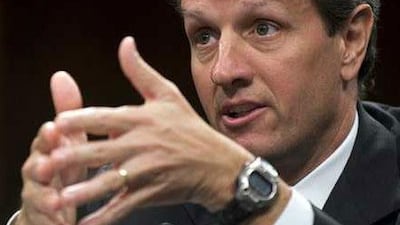The US Treasury secretary, Timothy Geithner, pointed to signs of an economic recovery and did his best to quell worries over a weaker US dollar during a visit to Saudi Arabia Tuesday. "The policies of the United States are designed to lay the conditions for a strong dollar, for more stability in the international monetary system and among the major economies," Mr Geithner said in a speech at the Jeddah Chamber of Commerce. The remarks during Mr Geithner's first visit to the Middle East as Treasury secretary were intended to placate large investors across the globe who have grown concerned in recent months that big economic stimulus packages designed to rescue the US from the financial crisis could play havoc with the value of the dollar. "Given the dollar's role in the international financial system and the significant impact of the US economy on global economic conditions, we fully recognise that the United States has a special responsibility to play," Mr Geithner said. Governments in the Gulf hold large amounts of dollars in currency reserves, thanks to revenues from oil. Sovereign wealth funds in the GCC, including the Abu Dhabi Investment Authority (ADIA) - which is estimated to have assets worth roughly US$300 billion (Dh1.1 trillion) - also have large holdings in dollar-denominated assets. In addition, the currencies of the UAE, Saudi Arabia, Qatar, Oman and Bahrain are pegged to the dollar, while Kuwait's currency is pegged to a basket of currencies weighted heavily to the dollar. These factors mean the economic fortunes of the Gulf are intimately linked with the value of the dollar. Economic policy in the US, however, has been focused recently on aiding the US economy by driving interest rates down and selling more US government debt, actions that many people fear threaten to weaken the currency. The US would unwind stimulus measures and reduce its $1tn-plus budget deficit, Mr Geithner said, but only when the financial crisis had clearly ended. "We are very committed to make sure that, as we get through this crisis, we bring down our fiscal deficits and reverse these extraordinary interventions," he said. Mr Geithner's speech yesterday mirrored one he gave last month in China, which owns almost $800bn in US Treasury debt, making it the largest single government holder of US sovereign debt in the world. China, Brazil and Russia have recently been calling for a more diversified international currency regime that would replace the dollar's role as the global reserve currency, in part to challenge what the three countries see as excessive American control over their sovereign wealth. Mr Geithner praised Saudi Arabia's efforts at recovering from the financial crisis, saying monetary policy had been "appropriately aggressive". "Here in Saudi Arabia, the non-oil economy continues to expand, boosted by one of the largest stimulus packages of any G20 nation and by very aggressive, appropriately aggressive, monetary policy and financial sector actions," he said. Globally, Mr Geithner said that while the economic crisis had not ended, recent signs indicated the seeds of a recovery had been firmly planted. "We are seeing very active issuance in corporate bonds and equity markets, and the banking system shows signs of more confidence," Mr Geithner said. "The force of the global recession is receding." But he warned that it would still take "considerably more time" to get the global economy back on track. Although the IMF recently increased its global forecast to 2.5 per cent growth in 2010, he said that rate was "slower than typical for recoveries, but recovery nonetheless". Mr Geithner is scheduled to visit Abu Dhabi today as part of a trip that has taken him from London and Jeddah to the capital, before he visits Paris tomorrow. * with agencies afitch@thenational.ae

Geithner says US recession easing
The US Treasury Secretary said in Jeddah during his trip to the Middle East that signs of economic recovery were evident.
Most popular today
